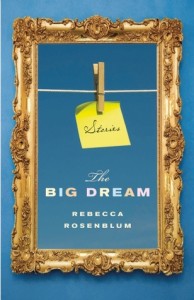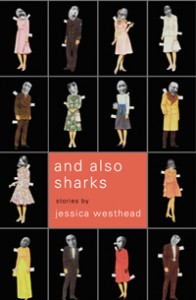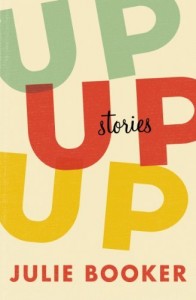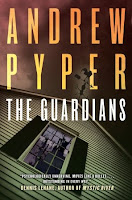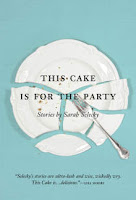 One very good lesson for life: One should not read any other books whilst one is reading Emma by Jane Austen. They will all pale by comparison. So, it’s unfair to This Cake is for the Party that I had to stop at page 258 in Emma for a couple of hours to read Sarah Selecky’s short story collection for my book club.
One very good lesson for life: One should not read any other books whilst one is reading Emma by Jane Austen. They will all pale by comparison. So, it’s unfair to This Cake is for the Party that I had to stop at page 258 in Emma for a couple of hours to read Sarah Selecky’s short story collection for my book club.
This is not your average book club, just let me state that for a fact. I swore up and down, left and right, to hell and back, that I would never, ever join another book club. It’s not that I didn’t like my first book club experience. Let me just say it wasn’t for me. The ladies were lovely people. But they weren’t book people. It’s important for book people to be in clubs with other like-minded book people. They don’t have to all like the same books, they just need to read the books, want to talk about the books, want to talk about what works within the books and what doesn’t. My first book club didn’t do this — we had a blow job class once, that’s how far we fell. And I judged. And then I ruined that book club with one drunken night a club and some misheard gossip. Oh yes, but that’s not a story for the internet. Like I said, lovely people, but now, my new club, The Vicious Circle, is full of delicious, delightful, delectable, defined book people. We talk books non-stop. I feel like I am swimming with my own school for once; it’s an important feeling. Books are important. They start with words on a page; it’s only fitting that people use words to critique, enjoy, discuss, etc.
Annnywaay, so, long story short, we read This Cake is for the Party this month. Now, I don’t read a lot of short story collections. I tend to only go back to them if I’ve read a novel by an author I fall in love with and then double back to read earlier material. Case in point: Tim Winton. Or if the collection is written by Alice Munro, because, well, it’s Alice Munro. But we’ve been reading a lot of short story collections for book club — last month it was Jessica Grant, this month it’s Selecky, and next month we are reading Alexander MacLeod’s Light Lifting. I will freely admit that half-way through the meeting last night, I did say, “Can we then read a novel please?” It’s not that I don’t appreciate the art form — it’s that I expect a lot from it. The stories must have guts, be whole, feel intensely, and travel a long way from start to finish. These are high standards. But if you don’t have high standards, what’s the point?
Did Selecky‘s collection pull its weight? Not entirely. I’m being perfectly, perfectly honest now — I would have never read this book were it not short listed for the Giller prize nor a selection for my book club. And even after dedicated two solid hours to it, and saying out loud to my RRHB as I read feverishly while the RRBB took an abnormally long nap in his bed, I did like it overall. A couple of the stories truly broke my heart — especially “Where Are You Coming From Sweetheart,” which is about a teenage, motherless girl having trouble with her father’s completely inadequate parenting skills. She desperately wants to escape Sudbury and live with her aunt Juicy (LOVE aunt Juicy) and her cousin in Mississauga, where she wouldn’t have to stalk local parks for empty beer bottles and water her father’s growing collection of half-dead plants. There’s an ache to this story that so accurately reflects what it’s like to be in a house post-tragedy and it resonated with me personally for reasons I don’t have to repeat here.
The other story that blew my mind, that had the guts I so search out in a short story collection, was “Paul Farenbacher’s Yard Sale.” Meredith, neighbour of Paul Farenbacher, starts the story calm, cool and collected as the widow of the story’s namesake clears out her house after the death of her spouse. There’s anger, resentment, and a wonderful, wonderful scene at the end that I won’t spoil because it is delicious.
Lastly, there’s a delicious ending to the second story in the collection, “Watching Atlas,” that I wished more of the less strong pieces emulated. Often, I felt like the stories just ended for the sake of ending and, in the format, I truly believe that endings are even more important than beginnings.
But then, a lot of the stories feel too poised, they feel like they’ve been written and re-written, and there’s one in epistolary format that didn’t work for me at all. The other story that I really had trouble with was “One Thousand Wax Buddhas.” There was the use of the second person. And this isn’t something I can hold against Selecky. It’s important to play with form to get to the heart of your characters, to push your writing to another level, but I really hate the second person. Again, this is a personal opinion. I also am not entirely fond of “quirky” for the sake of “plot” — when characters have “quirks” that stand in for actual action — which is a point that came up last night.
She’s a polished writer, and there were some lines in this collection that were undeniably amazing. I earmarked about a half-dozen pages throughout, and even read a couple passages over because I liked them so much. There’s also a coherence to this collection that was missing from Jessica Grant’s book, these stories fit together even though they aren’t linked, but Selecky needs to rely less on her own devices (lots of extra-marital sex [what is it with affairs and books for me these days]; plenty of hippies making work in their basements and other places in their houses; and male voices that weren’t 100% believable). In a way, I felt these characters all needed to get out and live more — but that’s just me.
So, overall, my review of the book is mixed. Yes, I liked it. Yes, there were some truly great bits of prose. Yes, there were two or three stories that made me stand up and shout. And then there were some that weren’t on the same level as the others, for me. I think it’s important to read writers and read first books, to support the new generation of Canadian writers, and Selecky does that herself by teaching creative writing. But I got the sense that she has spent a lot of time with these stories. I am curious, now, to see what she’ll write next, or to see what she’ll publish less, if it’ll be more stories or a longer piece of fiction. But, regardless, I am hooked. I will happily read whatever she does next.
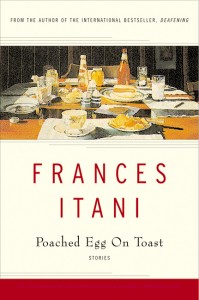 I read a lot of good books. Books I’d recommend heartily to friends and family. Books I push on strangers at various events. Books I try to sell. Books with good writing, a solid story, and that provide a solid experience from start to finish. Good writing is good writing. But great writing, well, that brings an emotional depth that resonates and goes beyond the story itself. Poached Eggs on Toast is, simply put, great writing. Frances Itani’s Deafening was a glorious novel, but I think that when she’s faced with the short story, her work packs a punch that the format allows–there’s no doubt that the pieces in this collection benefit from their length. They are focussed, sharp, intense, and brilliantly characterized.
I read a lot of good books. Books I’d recommend heartily to friends and family. Books I push on strangers at various events. Books I try to sell. Books with good writing, a solid story, and that provide a solid experience from start to finish. Good writing is good writing. But great writing, well, that brings an emotional depth that resonates and goes beyond the story itself. Poached Eggs on Toast is, simply put, great writing. Frances Itani’s Deafening was a glorious novel, but I think that when she’s faced with the short story, her work packs a punch that the format allows–there’s no doubt that the pieces in this collection benefit from their length. They are focussed, sharp, intense, and brilliantly characterized.